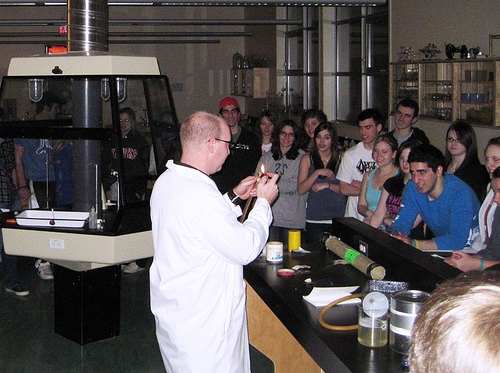<p>Estimates suggest at least half of all Americans drink more than four cups of coffee every day. That&#8217;s roughly 45 million pounds of coffee! Humans aren’t the only creatures looking for a buzz from a favorite caffeine product. Researchers have discovered that bees seek out nectar naturally laced with caffeine—mostly citrus and coffee flower nectar.</p>
<p>In the field and in the lab, scientists look for ways to mimic natural phenomena to improve daily life for humans. Discovering that bees experience improved memory and heightened energy from a dose of natural caffeine would not be possible without a great lab director.</p>
<h3><strong>What Makes a Good Lab Director?</strong></h3>
<p><strong>Evaluating and Training Skills</strong></p>
<p>One essential skill for every lab director is the ability to evaluate staff expertise. While it&#8217;s imperative for every lab worker to have a background in science, it&#8217;s equally important for employees to understand safety protocol.</p>
<p>A director’s role includes training and supervising employees to ensure safe practices as well as maintaining integrity for samples and experiments while protecting people and property from harm.</p>
<p><strong>Superior Communication Skills</strong></p>
<p>Directors coordinate activity both inside the lab and with vendors, financial supporters, other research facilities and many other people outside the facility. Communication skills not only keep the lab operating smoothly, but also ensure sustained growth and set the bar for higher quality data delivery. A good manager will also work to establish communication channels that allow lab personnel to respond to a rapidly changing environment.</p>
<p><strong>Education</strong></p>
<p>Whether the lab is a research facility, a medical testing center or a combination clinical setting, managers must possess a broad range of knowledge in the chosen field. Workers need a supervisor that can lead them and answer difficult questions.</p>
<p><strong>Lab-Building Skills</strong></p>
<p>Designing a lab requires organizational skills, a thorough understanding of the latest technological tools and an up-to-date research library.</p>
<p>Setting up an efficient, productive workplace involves selecting the proper identification products for chemicals, solutions, cleansing agents and dry storage items. Proper identification on all hazardous materials helps prevent injury and property loss.</p>
<p><strong>General Duties</strong></p>
<p>An effective laboratory manager has an extensive set of job skills that include people skills, research skills, risk management abilities and knowledge of technology and equipment necessary to provide reliable data. In addition, she must possess competence in the areas below.</p>
<ul>
<li>Maintain a productive work environment</li>
<li>Supervise all activity in the lab</li>
<li>Assign best-fit tasks for technicians according to skill level</li>
<li>Maintain records and supply inventory</li>
<li>Encourage and support professional development</li>
<li>Oversee or perform equipment maintenance</li>
<li>Establish and monitor quality control systems</li>
<li>Establish safety procedures and legal compliance programs</li>
</ul>
<p>The next time you&#8217;re enjoying a caramel macchiato or a nice cold cola and a bee makes a dive for your beverage container, try to have some compassion. While there isn’t any definitive research that proves bees are susceptible to caffeine addiction, it hasn’t been ruled out yet. Somewhere, a skilled lab director is probably busy as a bee, working with his staff to find the answer to that question.</p>

The Buzz About What Makes A Good Lab Director
